The Bible: Lessons From the Life of King David
For an overview of what will be covered in this section, read 1 Samuel 16:1–1 Kings 2:12.
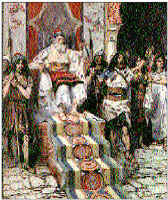 |
| “In Hebron [David] reigned over Judah seven years and six months, and in Jerusalem he reigned over all Israel and Judah thirty-three years” (2 Samuel 5:5). |
Uneasy and anxious, the officers and officials stood in a half circle around the aging king. A messenger, still panting hard after running from the battlefield, stood before them. The king’s careworn face focused intently on the messenger. “My lord the king, hear the good news! The Lord has delivered you today from all who rose up against you” (2 Samuel 18:31).
Smiles spread across the faces in the group. The tension of a few moments before disappeared. Everyone was visibly relieved. Everyone — except the king. “Is the young man Absalom safe?” he asked (verse 32). Silence again fell over the group, but this time it was a confused silence. The king’s attention still centered on the messenger. He waited to hear whether his son, the son who had seized power from him, the son who tried to destroy him, was still alive. “May the enemies of my lord the king and all who rise up to harm you be like that young man,” the messenger replied (verse 32).
The words thrust themselves at King David, striking him like the blow from a spear. His eyes became vacant and his shoulders slumped forward. His head dropped into his hands. A great emptiness welled up in his stomach. Suddenly, he turned and walked away. When he reached his private chamber above the gateway, he wept. “O my son Absalom!… O Absalom, my son, my son!”
The death of Absalom was a double tragedy. First, because David was a man of strong passions, a man who loved Absalom even when Absalom made himself an enemy. And second, because David recognized his own shortcomings; he saw his own guilt in the death of his son.
Absalom’s death was a result of David’s own sins. Years before, he had committed adultery with Bathsheba, the wife of Uriah, one of his loyal soldiers. Then, when Bathsheba became pregnant, he arranged to have Uriah killed in battle at Rabbah (2 Samuel 11–12). For these great sins, God had determined to punish David, making him experience the fruit of such actions. David was to be the victim of violence within his own family:
‘Now, therefore, the sword will never depart from your house, because you despised me and took the wife of Uriah the Hittite to be your own.’ This is what the Lord says: ‘Out of your own household I am going to bring calamity upon you. Before your very eyes I will take your wives and give them to one who is close to you, and he will lie with your wives in broad daylight’” (2 Samuel 12:10-11).
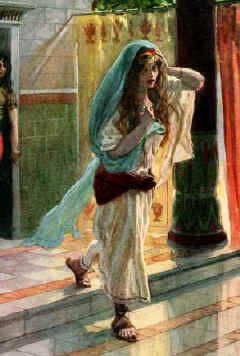 |
| The desolation of Tamar, by James Tissot |
Years later, David’s son Amnon raped his half-sister Tamar, beginning the fulfillment of that prophecy. Amnon had sinned because he failed to control his sexual desire, much as David had failed to control his lust for Bathsheba. David found himself emotionally unable to punish Amnon, the firstborn son and heir apparent.
It was this failure of justice that set Absalom, Tamar’s brother, at odds with David. Since David wouldn’t act, Absalom did. He felt David was wrong, so he took matters into his own hands, murdering Amnon. Once again, uncontrolled sexual desire had led to murder. Once again, David had been faced with the painful results of sin. And once again, David had failed to act, unable emotionally to punish his son for a sin he himself had also committed.
Absalom fled from David, but returned three years later. At that time, undoubtedly still harboring bitterness toward his father, Absalom began to plot against him. There was an irony in the way Absalom gathered support among the people. He would “stand by the side of the road leading to the city gate” (2 Samuel 15:2), empathizing with those individuals who sought justice. Just as Absalom believed he and his sister were the victims of injustice, he convinced others that they would remain victims until he was their judge.
Once the rebellion had begun and David had fled Jerusalem, Absalom “lay with his father’s concubines in the sight of all Israel” (2 Samuel 16:22). It was another bitter irony for David, who so long before had taken another man’s wife. This act made reconciliation impossible. In the ancient Near East, taking the concubines or wives of the king signified a transfer of power. David could never publicly be reconciled to Absalom. And yet, because of his great love as well as his guilt, David wanted Absalom to live.
The death of Absalom is a pivotal point in the life of David. In one sense, David’s reaction to Absalom’s death defines and symbolizes the character of David. He was a man of passion, a man of great emotion. He intensely felt life’s joys and sorrows, triumphs and defeats. That passion was evident at the death of Saul and Jonathan, so many years before. Saul was another man David loved, another man who had made himself David’s enemy. Although Saul had twice tried to kill David, David remained loyal to him. More than that, David loved Saul as a father. When Saul and Jonathan died, David sang a lament praising both for their heroic deeds and for their service to Israel.
A man after God’s heart
David lived with an energy and enthusiasm that often surprised or confused others. While the ark of the covenant was being transported to Jerusalem, “David, wearing a linen ephod, danced before the Lord with all his might” (2 Samuel 6:14). He rejoiced wholeheartedly, knowing that the presence of the ark in Jerusalem symbolized the presence of God in the capital of Israel. His mind and heart were fixed on that thought, not on his own dignity.
But his wife Michal, the daughter of Saul, despised David when she saw him dancing in the streets. David was dressed in the simple linen ephod of the priests, a garment she deemed unbecoming to a king. Even worse, to her he seemed undignified, “leaping and dancing” (verse 16). Michal focused on the petty and insignificant. She couldn’t understand why David did what he did. But David saw what really mattered.
In a sense, this difference in David’s attitude is what set him apart from others. David wasn’t just a passionate man, but a man passionate about the right things. Though men and women may not have seen it, God certainly did. He chose David to be king because of that difference.
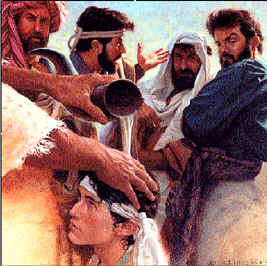 |
| “So Samuel took the horn of oil and anointed [David] in the presence of his brothers, and from that day on the Spirit of the Lord came upon David in power” (1 Samuel 16:13). By Mike Wimmer. |
Years before, when Samuel went to Bethlehem to anoint one of the sons of Jesse to become king in Saul’s place, he thought God had chosen Eliab. Like Saul, who was “a head taller than any of the others” (1 Samuel 9:2), Eliab was tall. But just as height had not made Saul a good king, height didn’t make Eliab qualified to rule. God wasn’t impressed by Eliab’s stature. God looked at the sons of Jesse differently: “Do not consider his appearance or his height, for I have rejected him [Eliab]. The Lord does not look at the things man looks at. Man looks at the outward appearance, but the Lord looks at the heart” (1 Samuel 16:7).
God saw what was in David’s heart. God saw that David was a man who was more concerned with God’s will than his own. That’s why God chose him: “The Lord has sought out a man after his own heart” (1 Samuel 13:14; see also Acts 13:22).
David and Saul
Although imperfect, David demonstrated both desire and commitment to fulfill God’s will throughout his life. Even after David was anointed to be king, knowing he would rule in Saul’s place, he refused to usurp Saul’s God-given authority as king. Instead, David waited for God to place him on the throne. That wait may have been as long as 17 years. During many of those years, Saul unjustly persecuted David, seeking to kill him.
During that time, David had opportunities to kill Saul, but refused to lift his hand against him. He knew Saul had been God’s anointed. He respected God’s prerogative. So he waited. Twice those opportunities came. Twice men loyal to David failed to understand why David didn’t kill Saul.
The first time, David and his men were hiding in the back of a cave — hiding because Saul and his army of 3,000 were pursuing them. Unaware of the presence of David’s small band of men, Saul “went in to relieve himself” (1 Samuel 24:3). David’s men encouraged him to kill Saul, thinking God had delivered Saul into David’s hands. David refused to lift his hand against Saul, but he did cut off a corner of his robe. Later, even though he had only cut Saul’s robe, “David was conscience-stricken…. He said to his men, ‘The Lord forbid that I should do such a thing to my master, the Lord’s anointed, or lift my hand against him; for he is the anointed of the Lord’” (verses 5-6).
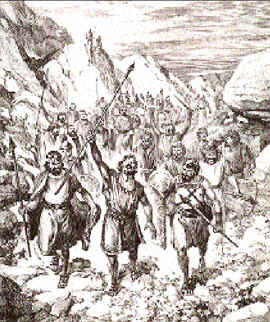 |
| David’s “three mighty men” — Josheb- Basshebeth, a Tahkemonite; Eleazar son of Dodai the Ahohite; and Shammah son of Agee the Hararite — in the front line of David’s faithful army that fought against the Philistines (see 2 Samuel 23:8-12). By Ken Tunell |
The second time David had an opportunity to kill Saul occurred when Saul was again pursuing him. Saul and his men were encamped in the wilderness not far from David. While they slept, David and a loyal captain, Abishai, crept up close to Saul’s camp. Abishai volunteered to kill Saul, but David stopped him, asking, “Who can lay a hand on the Lord’s anointed and be guiltless?” (1 Samuel 26:9). Instead of killing Saul, David took the spear and water jug near Saul’s head.
David was angry that Abner, Saul’s military commander, had left Saul exposed to danger while he slept. After David and Abishai reached the hill opposite Saul’s camp, “he called out to the army and to Abner” (verse 14). David rebuked Abner, asking: “You’re a man, aren’t you?… What you have done is not good. As surely as the Lord lives, you and your men deserve to die, because you did not guard your master, the Lord’s anointed. Look around you. Where are the king’s spear and water jug that were near his head?” (verses 15-16).
David was concerned for the safety of Saul, despite the fact that Saul hunted him to kill him. David was careful to seek God’s will, not his own. David trusted God, knowing that when God was ready, he would put David on the throne of Israel. David accepted God’s will, even when it hurt.
After he had committed adultery with Bathsheba and arranged for Uriah’s murder, the son born of Bathsheba became ill. David fasted and prayed for his son seven days, but the child died on the seventh day. The servants were afraid to tell David. They had urged David to eat while the child was still alive. They were afraid of what he would do when he found out his son had died: “For they thought, ‘While the child was still living, we spoke to David but he would not listen to us. How can we tell him the child is dead? He may do something desperate’” (2 Samuel 12:18).
David surprised them. When he discovered that his son had died, he bathed, changed clothes and ended his fast. His servants were confused. It seemed to them that his grief should have been greater after the child died. But David’s fast was not a ritual or a show of grief. It was an earnest appeal to God to allow the child to live. When the child died, David had God’s answer, and he accepted that answer. After the answer came, David worshiped God (verse 20).
David and Goliath
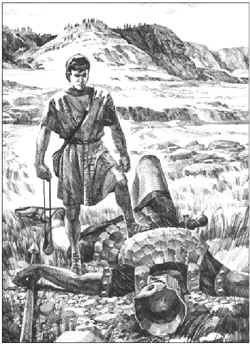 |
| “So David triumphed over the Philistine with a sling and a stone; without a sword in his hand he struck down the Philistine and killed him. David ran and stood over him” (1 Samuel 17:50-51). Illustration by Ken Tunell; click here for another illustration. |
Perhaps the best-known story about David is his encounter with the Philistine giant, Goliath. This story demonstrates another trait of David that made him so dear to God. This story shows how great David’s faith was. Goliath, who was almost 10 feet tall, had ridiculed the armies of Israel, making them look cowardly and foolish. At that period in history, it was customary among some peoples in the region to select champions to fight in place of the armies. When both armies agreed to abide by the outcome of personal combat between two champions, neither needed to engage in battle.
Goliath, taunting Israel every morning and evening, offered himself as the champion of the Philistines. For 40 days he asked the Israelites to provide a worthy opponent, but no one dared face a warrior of that size (1 Samuel 17:1-11, 16). All were afraid; all lacked faith.
At the time, David was too young to be in the army. He was left to tend his father’s sheep. His father sent him to the Valley of Elah, where Saul and Israel’s armies were gathered, to take roasted grain and bread to his three older brothers, and cheese to their commander.
When David arrived, he heard the taunts of Goliath. He was outraged and indignant. It was not the proud and boastful indignation of youth, but righteous indignation at the insult to God and at the reproach on Israel. David asked, “Who is this uncircumcised Philistine that he should defy the armies of the living God?” (verse 26).
David wasn’t a warrior, and he knew it. But David had a weapon Goliath didn’t have — faith in God. He was willing to face Goliath because he was unwilling to see the Philistine giant mock the living God. David knew that it wasn’t his fight, but God’s. He trusted in God for protection when he faced Goliath: “You come against me with sword and spear and javelin, but I come against you in the name of the Lord Almighty, the God of the armies of Israel, whom you have defied” (verse 45).
Then, unlike the men of Israel who had fled from Goliath (verse 24), David ran toward the giant. He didn’t wait for Goliath to approach him, but ran forward, eager to take away the reproach from Israel. God was with David and with Israel, defeating the arrogant giant and routing the shocked Philistine army.
Repentance
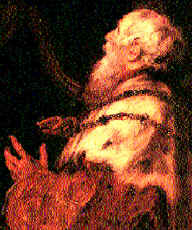 |
| God said, “I have found David son of Jesse a man after my own heart; he will do everything I want him to do” (Acts 13:22; see also 1 Samuel 13:14). |
King David was the only person described by God as “a man after my own heart” (Acts 13:22). Yet, David wasn’t without sin. How could God call an adulterer and murderer a man after his own heart? The answer is the greatest lesson we can learn from the life of David — repentance. Although David sinned, he always repented.
After David committed adultery with Bathsheba and arranged to have Uriah killed, the prophet Nathan confronted him with his sins. David didn’t excuse himself, as Saul had done when he spared the best of the Amalekite livestock against God’s will (1 Samuel 15:3, 9). When David was confronted with his adultery and murder, his answer was simple and straightforward: “I have sinned against the Lord” (2 Samuel 12:13).
Later, David wrote one of his most moving psalms to express his remorse. In Psalm 51, David asked God to forgive him and to extend mercy to him. But more than that, the psalm gives us further insight into David’s passionate approach to life: “Have mercy upon me, O God, according to Your lovingkindness; according to the multitude of Your tender mercies, blot out my transgressions. Wash me thoroughly from my iniquity, and cleanse me from my sin. For I acknowledge my transgressions, and my sin is ever before me” (Psalm 51:1-3, NKJV).

